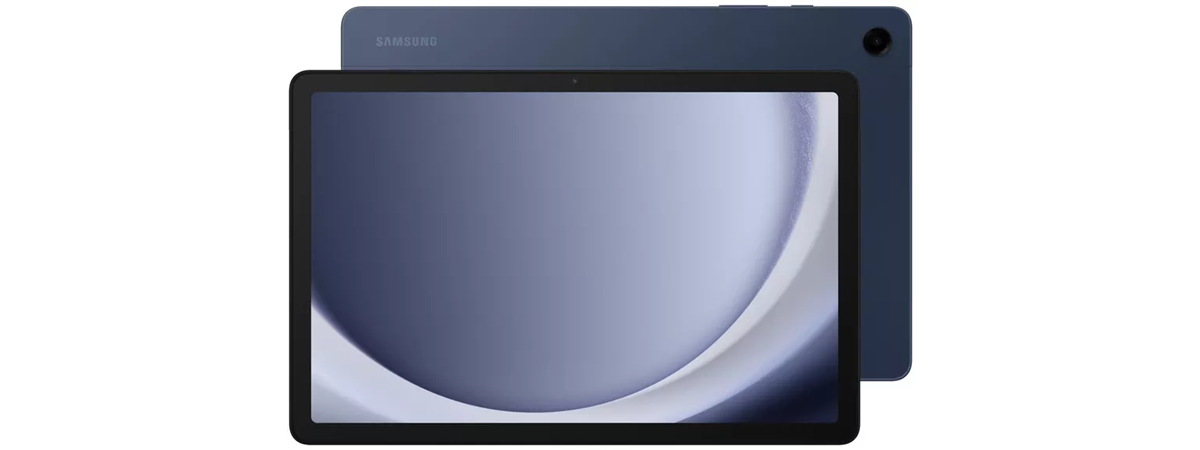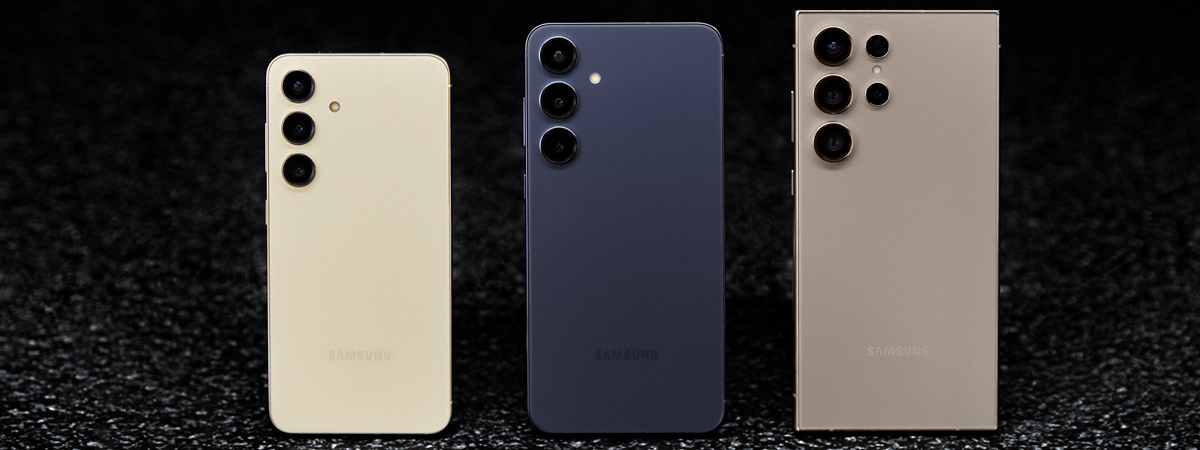
Performance in benchmarks
Unfortunately, I didn’t test other tablets in recent months, so I couldn’t compare the Samsung Galaxy Tab S10 Ultra with a competitor. However, sharing some benchmark results with you, without a comparison, isn’t very useful. So I decided to compare this tablet and its benchmark results with a Samsung Galaxy S24. This way, we can see whether this tablet matches the performance offered by a flagship smartphone launched this year. Here are my results:
The first benchmark I ran is Geekbench 6, which evaluates both the processor (CPU) and the graphics chip (GPU) and gives you some scores to evaluate the general level of performance you get. As you can see below, Samsung Galaxy Tab S10 Ultra fared very well when measuring the processor’s performance, with results similar or higher than those measured on a Samsung Galaxy S24. It performed well in the graphics department too, without being the performance leader in my comparison.
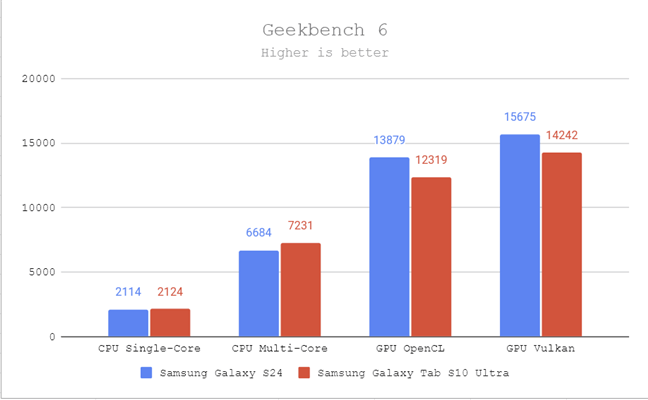
Samsung Galaxy Tab S10 Ultra - Performance in Geekbench 6
Geekbench AI is a cross-platform benchmark that uses machine learning tasks to evaluate AI workload performance. Since Galaxy AI is one of the features that Samsung promotes heavily, the tablet’s performance in this area is important.
Below, you can see the scores I got, which are pretty good across the board. Unfortunately, Geekbench AI didn’t exist when we reviewed the Samsung Galaxy S24. This app was recently launched, so we don’t have data for comparison from other devices.
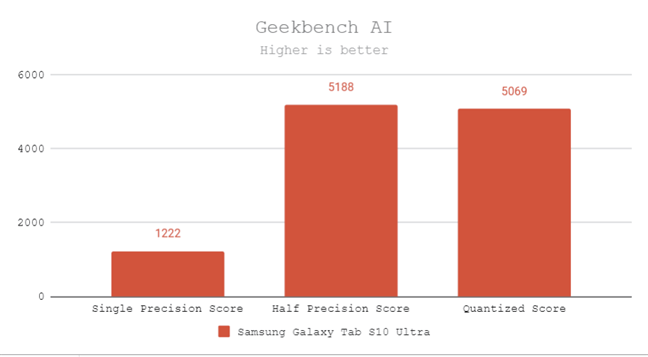
Samsung Galaxy Tab S10 Ultra - Performance in Geekbench AI
Many people will likely buy the Samsung Galaxy Tab S10 Ultra to use it for productivity apps like document writing, data manipulation, video editing, or comfortable web browsing. To evaluate how it fares when running such tasks, I used PCMark for Android. The tablet got an average score of 16541 points, which is similar to what you get from flagship smartphones.
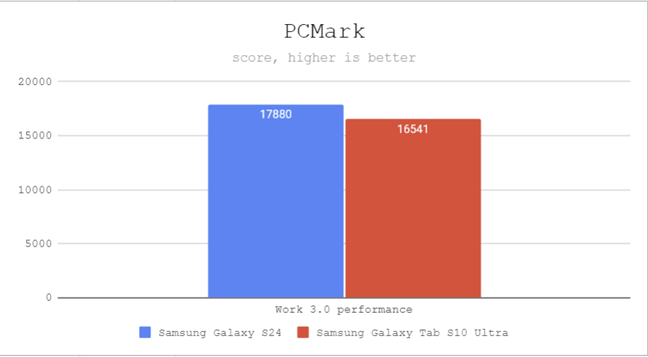
Samsung Galaxy Tab S10 Ultra - Performance in PCMark
Even though not many people will buy this tablet for gaming, I ran 3DMark anyway, and it's Solar Bay and Wild Life Extreme tests. As you can see below, the Galaxy Tab S10 Ultra performed very well, with excellent results in both tests, proving that this tablet can run games with maximum ease. The only problem is its size, which makes it uncomfortable to hold in your hands when gaming.
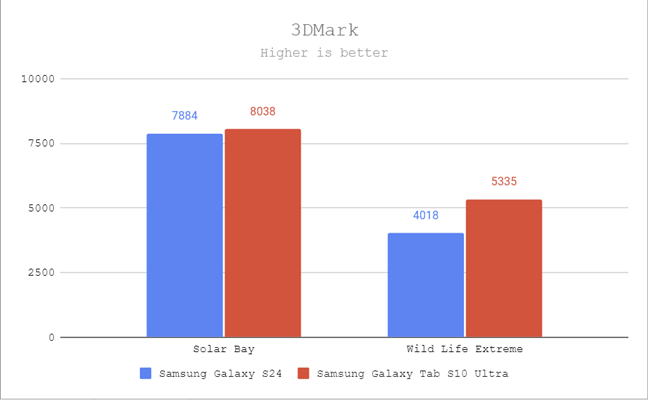
Samsung Galaxy Tab S10 Ultra - Performance in 3DMark
To evaluate the battery life objectively, I used the Work 3 battery life test included in PCMark. Samsung Galaxy Tab S10 Ultra lasted for nine hours and thirty-six minutes. While it’s not a bad autonomy, it's not a great one either, signaling that the Mediatek Dimensity 9300 chipset powering this tablet is not as energy efficient as other competing chipsets.
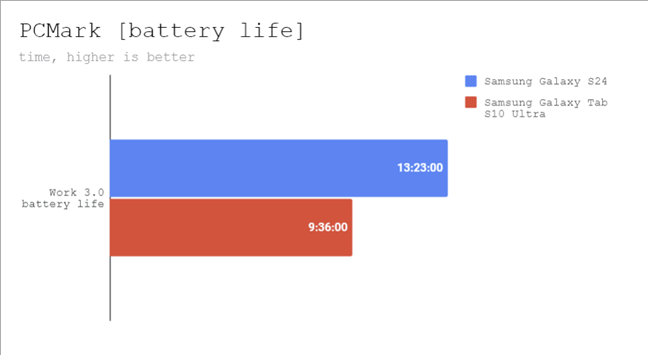
How long the battery lasts
For the last test, I ran the SpeedTest app on the Samsung Galaxy Tab S10 Ultra, to measure the maximum speed you get on this tablet when connected to a Wi-Fi 6 network.
The download speed I measured is 858 Mbps, which is close to the maximum potential of my internet connection. However, the upload speed was lower than what I get on other devices in my home network - 462 Mbps. Usually, other laptops and smartphones I’m using can reach upload speeds between 500 and 600 Mbps. If you plan to use this tablet to upload videos or other large files over the internet, its less-than-ideal upload speed may be important.
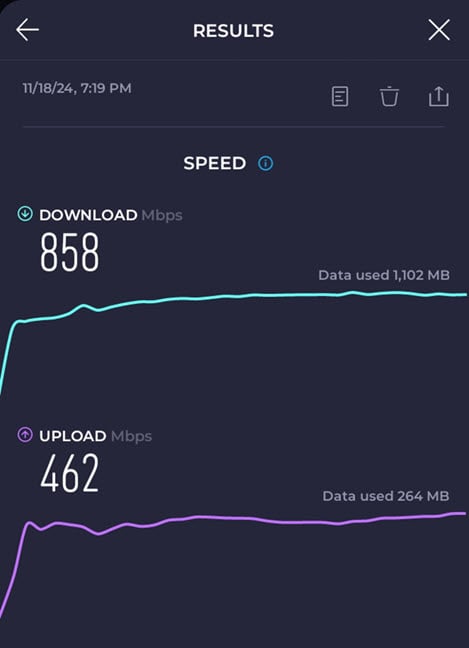
Uploading data over Wi-Fi isn't as fast as it could be
The benchmarks I’ve run revealed that Samsung Galaxy Tab S10 Ultra offers excellent performance across the board, similar to flagship smartphones. However, there are some minor weaknesses when it comes to its autonomy and the speed of Wi-Fi connectivity (uploads are slower than on other devices). Luckily, these aspects can be improved through firmware updates.
What do you think of the Samsung Galaxy Tab S10 Ultra?
I hope you enjoy reading this lengthy review and that you now have a better understanding of what the Samsung Galaxy Tab S10 Ultra can and can’t do for you. If you have any questions left unanswered, don’t hesitate to ask using the commenting options available below. And before you go, I would like to know: Do you like this tablet? What’s your opinion about its size? Does it make it an appealing choice for you, or do you prefer a smaller format?


 27.11.2024
27.11.2024 